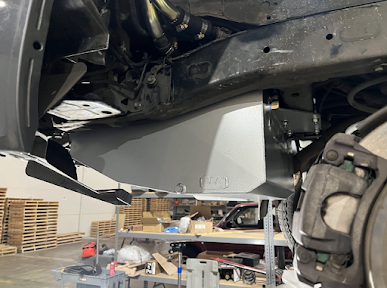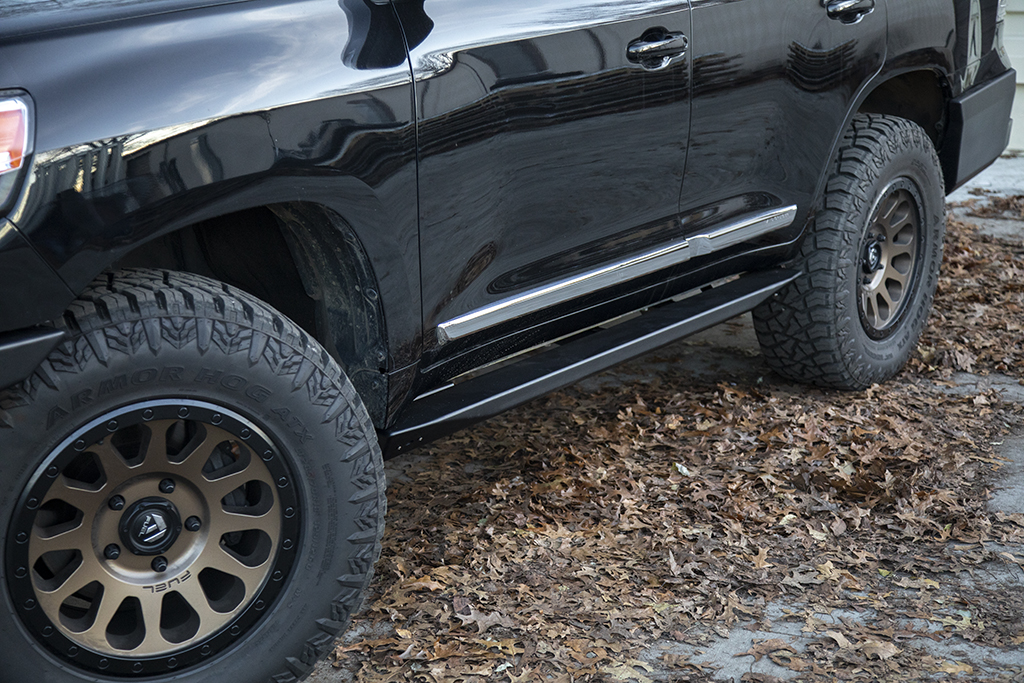Unpopular Opinion on Why the Land Cruiser 200 Series ISN'T the Greatest Toyota SUV of All-Time
May 3, 2024
Before I get started and inevitably offend a lot of Toyota enthusiasts, I will note that this is an opinion piece that is backed from my personal experience with my 200 Series and discussing with others. Please also note that while this is a Lexus LX570, I have converted the entire suspension to traditional coil-overs (including upper/lower control arms) to the Land Cruiser 200 Series; for all intents and purposes, this is a 200 Series and not an LX anymore. If you want more information on the conversion, I have some of it listed here and will update once that post is completed.
Introduction
My next complaint is on the inherent issues that exist within Toyota's 5.7L V8 engine. They are not to the extent of the inevitable Ford cam-phaser or imminent Subaru head-gasket failures, but they should be noted for potential buyers awareness. I truly believe that the Toyota community with the 5.7L is more enamored with speaking on the first-year issues of the revised 2022+ Tundra with the twin-turbo V6 than ever admitting there was a fault with their glorious 5.7L V8. Here are the known issues of the 5.7L (all vehicles with the 5.7L suffer these issues) with their associated cost of repair per RepairPal:
All of that said, I have sold my Lexus LX570 (yes, I don't technically have a Land Cruiser 200 Series, but the Lexus version). I have identified what I want that better suits my criteria of reliability, size, driving dynamics, and towing for less money. Here's a sneak peak of "Blueberry" (and if you know my history/preferences this shouldn't be surprising at all):
I've owned a LOT of cars; 30 in total. Of the vehicles that I have owned, the vehicle that I aspired to own more than all of them was the Toyota Land Cruiser 200 Series because of its nameplate, drivetrain, and proven reliability feats. After 3 years of ownership and nearly 50,000 miles with my 200 Series, I can say that the Land Cruiser 200 Series is not the greatest Toyota SUV of all time.
Before diving into this article, I do think it's important to capture my intended use-cases for 200 Series:
- 15,000 to 20,000 miles per year
- Reliability above all-else (2,000 mile road trips with no notice and not requiring any items outside of general maintenance)
- Ability to drive in any conditions (snow, rain, mud, etc.)
- Plenty capable of going off-road
- Context is required on this. I take my vehicles on probably moderate to bordering difficult trails in north Georgia 4-5 times per year)
- Towing 2-3 times per month (towing consists of 20' bow-rider boat, utility trailer, and car hauling) requiring a towing capacity of 7,000lbs
Land Cruiser Heritage (not the Edition)
Let's start from the top with what is the Land Cruiser. In the early 1950's Toyota released a vehicle built for the military called the Land Cruiser that was intended to be inexpensive to maintain and perform reliably in all environments.
Over the years and many generations later, Toyota updated the Land Cruiser from a small, primitive vehicle capable of going anywhere into a behemoth of an SUV built for the United States as a family-hauler known as the 200 Series. For context below are the dimensions for the first generation of Land Cruiser (FJ40) and the Land Cruiser 200 Series:
First Generation Land Cruiser Dimensions
- Wheelbase - 90"
- Length - 152"
- Width - 65"
- Height - 77"
- Weight 3,200lbs
Land Cruiser 200 Series Dimensions
- Wheelbase - 112"
- Length - 195"
- Width - 78"
- Height - 74"
- Weight 5,800lbs
My Issues with the Land Cruiser 200 Series
As you can tell, the Land Cruiser grew and grew to the point of essentially being unrecognizable from its miniscule origins. Now the real question is "Is this a bad thing?" as every other manufacturer has also ballooned their vehicles over the last several decades. In terms of being a family-hauling SUV, the Land Cruiser 200 Series is a great example with its 3rd row seats, heated/cooled seats, enough space in the trunk for almost anything, and an 8,100 pound towing capacity.
In terms of capability, the 200 Series is hands-down the most capable vehicle that I have ever had especially with its immense weight always being able to find traction and Crawl Control to escape any bad situation.
My largest complaint of the 200 Series is the general ethos of the vehicle as Toyota wants the consumer to believe it's built for anything. Frankly, the 200 Series is built for everything, but is heavily limited due to its immense size. To be blunt, the 200 Series is too large; ask me how I know...
Its capability though is diminished after the majority of off-road trails that I drive tend to cause new pin stripes from brush or find myself actively trying to avoid high-centering due to the long wheel-base. Smaller vehicles like a 4Runner, GX, Wrangler, Bronco, etc. do not have the same issues because they fit on trails. These size callouts do truly show that the 200 Series was built as a family-hauler first and second as a "go-anywhere" vehicle.
My next complaint is entirely subjective and will probably ruffle some feathers. The Land Cruiser 200 Series is too heavily over-engineered resulting in a vehicle that is too heavy for its own good. Here's why I feel this way:
- The parts and associated components of a Land Cruiser 200 Series are about double the size of a 4Runner/GX leading to diminished driver connection with the vehicle. This makes servicing the vehicle difficult as a component like a CV axle or rear springs go from 25lbs on a GX to about 45lbs on the 200 Series. As someone who services their vehicle, ease of access to parts/components for service is key to my long-term love of a vehicle
- The added weight comes from its shared architecture with the Tundra/Sequoia (frame, engine, transmission) and detracts from driving experience. The 200 Series goes anywhere, but poorly translates anything to the driver in terms of engagement. This is applicable to both on-road an off-road experiences as the vehicle feels as though it can go anywhere (it can fit), but detracts from the fun off-road where you are looking for limitations that you cannot feel or anticipate
My third compliant is on the size of the fuel tank in the 200 Series. To quickly recap, the 200 Series has a 24-gallon fuel tank. This sounds fine until you realize you are achieving 13 miles per gallon and the vehicle reads empty at 17 gallons used (7 gallons remaining) causing a constant question of "how much fuel is really left." Maybe this doesn't sound that bad to you, but a range of 220 miles is completely abysmal for any vehicle, regardless of size. Toyota missed the mark on this forcing you to suffer the same frustration that I have or purchase an auxiliary Long Range America fuel tank for $2,500...
My next complaint is on the inherent issues that exist within Toyota's 5.7L V8 engine. They are not to the extent of the inevitable Ford cam-phaser or imminent Subaru head-gasket failures, but they should be noted for potential buyers awareness. I truly believe that the Toyota community with the 5.7L is more enamored with speaking on the first-year issues of the revised 2022+ Tundra with the twin-turbo V6 than ever admitting there was a fault with their glorious 5.7L V8. Here are the known issues of the 5.7L (all vehicles with the 5.7L suffer these issues) with their associated cost of repair per RepairPal:
- Radiator Failure: $700-1,000
- Occurs on ALL 5.7L vehicles between 2008 and 2018. Change your radiator ASAP
- If you want guidance on how-to do this job, reference here
- Coolant Valley Leak: $2,000
- Cam-Tower Leak: $4,000-$5,000
My final complaint is around the aftermarket parts availability and pricing. The supply and demand curve of basic economics is a very real thing meaning that since there are less Land Cruiser 200 Series than say 4Runners/GX or Wranglers, the parts cost significantly more than they might for those other vehicles. For example, sliders for a 4Runner are between $500 to $800, while Land Cruiser 200 Series sliders are generally between $1,600 to $2,000.
I just bashed the greatest Overlanding Rig ever, so now what?
This article will probably convey that I hate the Land Cruiser 200 Series, but the honest truth is that it is a fantastic car. The 200 Series is safe, comfortable, stupidly capable, and relatively affordable these days that can be had for sub-$30,000 to take on all of the family-hauling that you ever need. My 200 Series is the best car I've ever had, due to its size and my noted complaints, there are better options that exist for off-roading and my use-cases.
I've alluded to it a lot in this article, but the perfect use-case for the 200-Series is a family that wants a car that can go anywhere safely and dependably. The ideal owner needs to tow over 5,000lbs once in a blue moon. It is the perfect car to drive every day and take on long road trips, but that's the end of the road unless you're working with wide trails. You need that smaller vehicle to go everywhere that your heart desires off pavement...
All of that said, I have sold my Lexus LX570 (yes, I don't technically have a Land Cruiser 200 Series, but the Lexus version). I have identified what I want that better suits my criteria of reliability, size, driving dynamics, and towing for less money. Here's a sneak peak of "Blueberry" (and if you know my history/preferences this shouldn't be surprising at all):

















Comments
Post a Comment